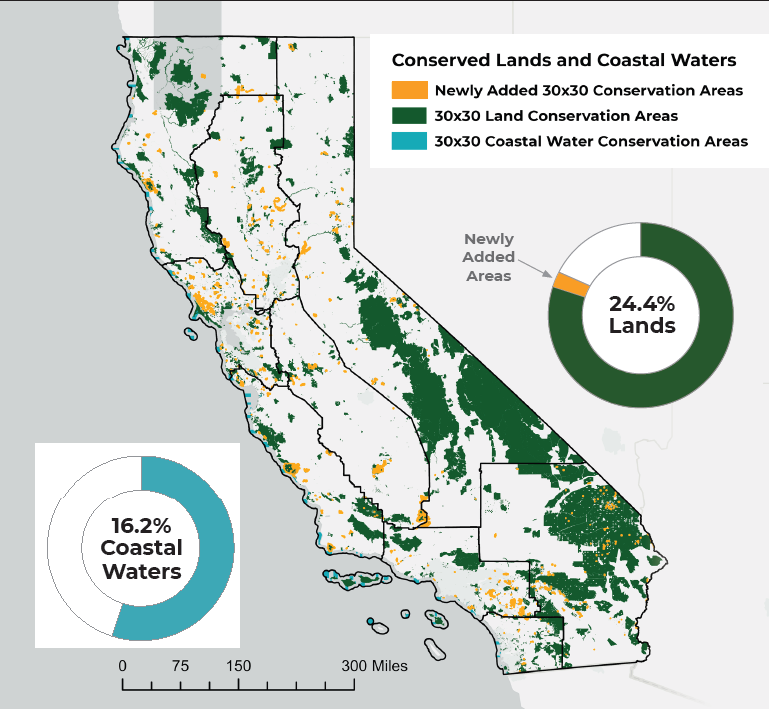WHAT YOU NEED TO KNOW: California reaches 24.4% of lands conserved after adding nearly 1,000 square miles since April 2022 – a monumental step towards achieving the state’s ambitious goal of conserving 30% of lands and coastal waters by 2030.
SACRAMENTO – Governor Gavin Newsom today announced major progress in the state’s efforts to conserve 30% of state lands and coastal waters by 2030. Since April 2022, California has added approximately 631,000 acres of conserved land (nearly 1,000 square miles), bringing our statewide total to 24.4% of lands and 16.2% of coastal waters. Watch the Governor’s video announcing this milestone here.

Known as the 30×30 initiative, Governor Newsom’s October 2020 Executive Order launched a once-in-a-generation opportunity to lead the world protecting and restoring nature as a climate solution. It calls for additional protection of 6 million acres of land and 500,000 acres of coastal waters in the next seven years to achieve 30×30.
In 2021, President Biden launched the same initiative at the federal level, putting the U.S. on track to conserve 30% of lands and waters nationally. And last year, world leaders came together to agree to protect 30 percent of land and waters in 190 countries across the world.
What Governor Newsom said: “California is setting the bar for conservation for other states and nations around the world. Preserving species in peril, breaking down barriers to the outdoors for underserved communities, working alongside Native peoples who have stewarded these lands and waters since time immemorial – our 30×30 initiative is restoring and protecting California’s unparalleled natural beauty for generations to come.”
The progress is detailed in an inaugural annual report, “Pathways to 30×30 California,” which highlights significant progress over the last year toward achieving three key objectives: 1) Protecting and restoring biodiversity; 2) Expanding access to nature; and 3) Mitigating and building resistance to climate change.
The report provides specific examples of projects that expanded conserved lands throughout the state, including:
- Banning Ranch: This $97 million acquisition consists of 387 acres of lowlands and coastal bluffs in Newport Beach and now connects nearly 1,000 acres of conserved coastal lands and waters. Over the next several years, former oil fields on the property will be converted to a public coastal park.
- YMCA Camp Jones Gulch: This voluntary conservation easement conserves 920 forested acres that will continue to host youth development opportunities, environmental education, recreation and community service.
- Wildlife Crossings: These crossings enable wildlife to safely traverse busy roadways, as well as find food sources and increase genetic diversity. Two notable crossings include one under construction at over Highway 17 in Santa Cruz County, which will also serve to connect more than 50 miles of previously fragmented regional trails, and the Wallis Annenberg Wildlife Crossing, which is expected to help preserve the mountain lion population in the Santa Monica Mountains (which could become extinct within 50 years without an influx of genetic diversity).

Governor Newsom joins the groundbreaking of the Wallis Annenberg Wildlife Crossing in April 2022.
The state’s commitment to equity, tribal partnerships and economic prosperity – pillars of the 30×30 initiative – is backed by more than $100 million in grants for local communities and tribes to implement conservation planning projects. The funding is part of $1.4 billion the state has directed to nature-based solutions to combat climate change and protect the state’s world-renowned biodiversity.

